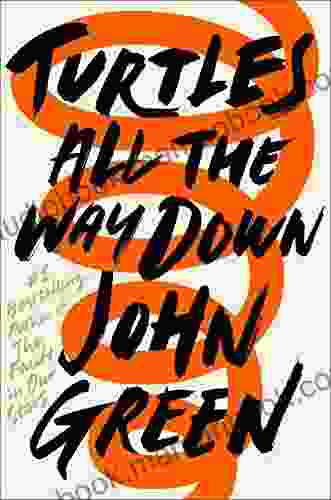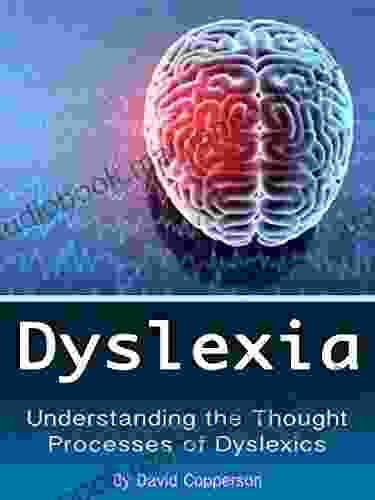Dyslexia: Understanding the Thought Processes of Dyslexics

Dyslexia is a learning disability that affects how a person interprets and processes information. People with dyslexia may have difficulty with reading, writing, and spelling, as well as with other skills such as math and organization. Dyslexia is not a sign of intelligence, and it does not mean that a person is lazy or unmotivated. It is simply a different way of learning.
There are many different theories about what causes dyslexia. Some researchers believe that dyslexia is caused by a difference in the way that the brain processes language. Others believe that dyslexia is caused by a difference in the way that the brain processes visual information. Still others believe that dyslexia is caused by a combination of factors.
4.6 out of 5
| Language | : | English |
| File size | : | 556 KB |
| Text-to-Speech | : | Enabled |
| Screen Reader | : | Supported |
| Enhanced typesetting | : | Enabled |
| Word Wise | : | Enabled |
| Print length | : | 23 pages |
| Lending | : | Enabled |
Regardless of the cause, there is no cure for dyslexia. However, there are many different ways to help people with dyslexia learn. These strategies can help to improve reading, writing, and spelling skills, as well as other areas of difficulty. With the right support, people with dyslexia can learn to overcome their challenges and achieve success.
How Dyslexia Affects the Thought Processes
Dyslexia can affect the thought processes in a number of different ways. These effects can include:
- Difficulty with reading. People with dyslexia may have difficulty with decoding words, understanding what they read, and remembering what they have read. They may also have difficulty with fluency, which is the ability to read smoothly and quickly.
- Difficulty with writing. People with dyslexia may have difficulty with spelling, grammar, and punctuation. They may also have difficulty with handwriting, which is the ability to write legibly and quickly.
- Difficulty with math. People with dyslexia may have difficulty with understanding math concepts, solving math problems, and remembering math facts. They may also have difficulty with spatial reasoning, which is the ability to understand and manipulate shapes and objects in space.
- Difficulty with organization. People with dyslexia may have difficulty with organizing their thoughts and materials. They may also have difficulty with time management and planning.
These are just a few of the ways that dyslexia can affect the thought processes. It is important to remember that not all people with dyslexia will experience all of these difficulties. The severity of the difficulties can also vary from person to person.
How to Help People with Dyslexia
There are many different ways to help people with dyslexia learn. These strategies can help to improve reading, writing, and spelling skills, as well as other areas of difficulty. Some of these strategies include:
- Multi-sensory instruction. This type of instruction uses a variety of senses to teach new concepts. For example, a teacher might use visual aids, auditory cues, and hands-on activities to teach a new math concept.
- Phonics instruction. This type of instruction teaches students the relationship between letters and sounds. This can help students to decode words more easily.
- Assistive technology. This type of technology can help people with dyslexia with reading, writing, and math. For example, a text-to-speech program can read text aloud, and a spell checker can help with spelling errors.
- Accommodations. This type of support can help to make it easier for people with dyslexia to learn in the classroom. For example, a student with dyslexia may be allowed to use a calculator on a math test.
These are just a few of the many different ways to help people with dyslexia learn. It is important to work with a qualified professional to develop a learning plan that is tailored to the individual needs of the student.
Dyslexia is a learning disability that can affect the thought processes in a number of different ways. However, with the right support, people with dyslexia can learn to overcome their challenges and achieve success. There are many different strategies that can help people with dyslexia learn, and it is important to work with a qualified professional to develop a learning plan that is tailored to the individual needs of the student.
4.6 out of 5
| Language | : | English |
| File size | : | 556 KB |
| Text-to-Speech | : | Enabled |
| Screen Reader | : | Supported |
| Enhanced typesetting | : | Enabled |
| Word Wise | : | Enabled |
| Print length | : | 23 pages |
| Lending | : | Enabled |
Do you want to contribute by writing guest posts on this blog?
Please contact us and send us a resume of previous articles that you have written.
 Top Book
Top Book Novel
Novel Fiction
Fiction Nonfiction
Nonfiction Literature
Literature Paperback
Paperback Hardcover
Hardcover E-book
E-book Audiobook
Audiobook Bestseller
Bestseller Classic
Classic Mystery
Mystery Thriller
Thriller Romance
Romance Fantasy
Fantasy Science Fiction
Science Fiction Biography
Biography Memoir
Memoir Autobiography
Autobiography Poetry
Poetry Drama
Drama Historical Fiction
Historical Fiction Self-help
Self-help Young Adult
Young Adult Childrens Books
Childrens Books Graphic Novel
Graphic Novel Anthology
Anthology Series
Series Encyclopedia
Encyclopedia Reference
Reference Guidebook
Guidebook Textbook
Textbook Workbook
Workbook Journal
Journal Diary
Diary Manuscript
Manuscript Folio
Folio Pulp Fiction
Pulp Fiction Short Stories
Short Stories Fairy Tales
Fairy Tales Fables
Fables Mythology
Mythology Philosophy
Philosophy Religion
Religion Spirituality
Spirituality Essays
Essays Critique
Critique Commentary
Commentary Glossary
Glossary Bibliography
Bibliography Index
Index Table of Contents
Table of Contents Preface
Preface Introduction
Introduction Foreword
Foreword Afterword
Afterword Appendices
Appendices Annotations
Annotations Footnotes
Footnotes Epilogue
Epilogue Prologue
Prologue John Irving
John Irving Carolyn Keene
Carolyn Keene Darlene Anita Scott
Darlene Anita Scott John Green
John Green Seymour Diamond
Seymour Diamond Kathryn Croft
Kathryn Croft Judith Maynard
Judith Maynard Giana Darling
Giana Darling Stephanie Middleberg Ms Rd Cdn
Stephanie Middleberg Ms Rd Cdn Jenny Joseph
Jenny Joseph Tryfon Tolides
Tryfon Tolides Sonovia Alexander
Sonovia Alexander Leslie Lipschitz
Leslie Lipschitz Marie Maxwell
Marie Maxwell Barack Obama
Barack Obama Ed Zahniser
Ed Zahniser Karen Meyers
Karen Meyers Ian Stables
Ian Stables Felicity Sedgewick
Felicity Sedgewick Toni Patrick
Toni Patrick
Light bulbAdvertise smarter! Our strategic ad space ensures maximum exposure. Reserve your spot today!

 Ignacio HayesUnveiling the Tale of Terror in Chapters 1: Parliament Station – A Literary...
Ignacio HayesUnveiling the Tale of Terror in Chapters 1: Parliament Station – A Literary...
 Jamison CoxThe Yablonski Murders: A Chronicle of Betrayal, Bloodshed, and the Fight for...
Jamison CoxThe Yablonski Murders: A Chronicle of Betrayal, Bloodshed, and the Fight for...
 Gil TurnerThe Savior: A Suspenseful Short Story that Will Keep You on the Edge of Your...
Gil TurnerThe Savior: A Suspenseful Short Story that Will Keep You on the Edge of Your...
 Fletcher MitchellTurtles All the Way Down: An Exploration of Identity, Anxiety, and the Power...
Fletcher MitchellTurtles All the Way Down: An Exploration of Identity, Anxiety, and the Power... Allan JamesFollow ·6k
Allan JamesFollow ·6k Christopher WoodsFollow ·19.1k
Christopher WoodsFollow ·19.1k James HayesFollow ·3.9k
James HayesFollow ·3.9k Jaden CoxFollow ·12.1k
Jaden CoxFollow ·12.1k Eric HayesFollow ·8.7k
Eric HayesFollow ·8.7k Matt ReedFollow ·19.7k
Matt ReedFollow ·19.7k Mario SimmonsFollow ·13.1k
Mario SimmonsFollow ·13.1k Jacob HayesFollow ·16.4k
Jacob HayesFollow ·16.4k

 Warren Bell
Warren BellRemembrance of Love and War: A Timeless Tale of Loss,...
Erich Maria Remarque's...

 Terry Bell
Terry BellNever Forget the Spring of 2024: A Defining Moment in...
The Spring of Transformation As the first...

 Jacob Hayes
Jacob HayesSplit Testing Profits: The Ultimate Guide to Optimizing...
In the highly...

 Jackson Blair
Jackson BlairSpending Your Way to Wealth: Is It Possible?
We've all heard...

 Jerome Blair
Jerome BlairBoxer: The Fight Within Micah Arnold - A Journey of...
In the heart of...
4.6 out of 5
| Language | : | English |
| File size | : | 556 KB |
| Text-to-Speech | : | Enabled |
| Screen Reader | : | Supported |
| Enhanced typesetting | : | Enabled |
| Word Wise | : | Enabled |
| Print length | : | 23 pages |
| Lending | : | Enabled |






